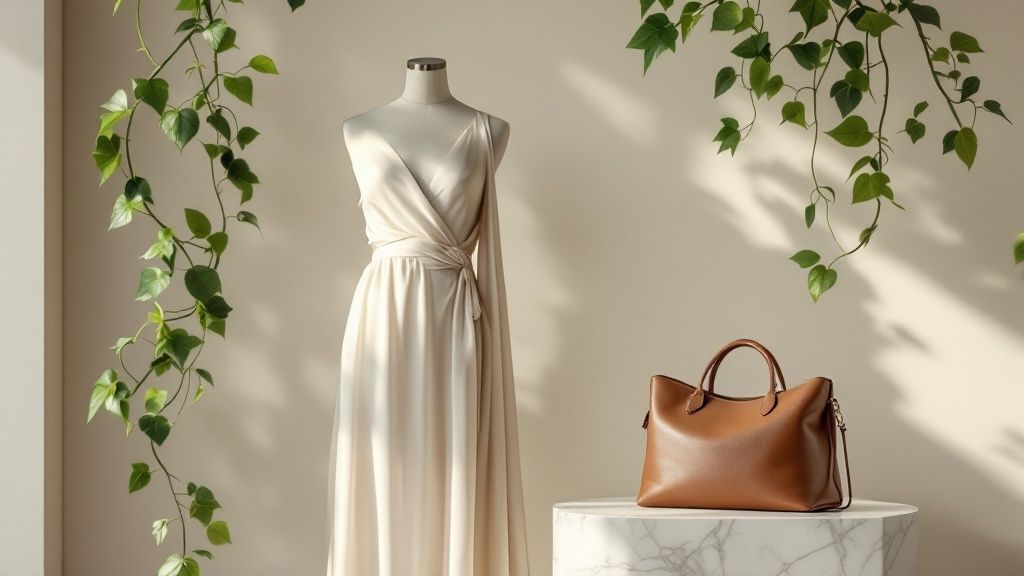Redefining Luxury: Style with a Conscience
Want to invest in high-quality fashion that aligns with your values? This list showcases eight sustainable luxury fashion brands proving that style and responsibility can coexist. Discover labels like Stella McCartney, Gabriela Hearst, and Eileen Fisher that prioritize ethical sourcing and minimize environmental impact. Find luxury pieces crafted with integrity, so you can enjoy premium fashion while contributing to a more sustainable future. Skip the research and explore these game-changing sustainable luxury fashion brands now.
1. Stella McCartney
Stella McCartney stands as a true pioneer among sustainable luxury fashion brands. Since its inception in 2001, the brand has championed ethical principles, rejecting the use of leather, feathers, fur, and exotic skins entirely. This commitment extends to innovative material sourcing, prioritizing regenerated cashmere, organic cotton, recycled nylon, and even mushroom-based leather alternatives. Furthermore, Stella McCartney reinforces its dedication to transparency through an annual environmental profit and loss account, meticulously measuring its ecological footprint and actively engaging with circular fashion principles. This makes Stella McCartney a top choice for the environmentally conscious luxury consumer.
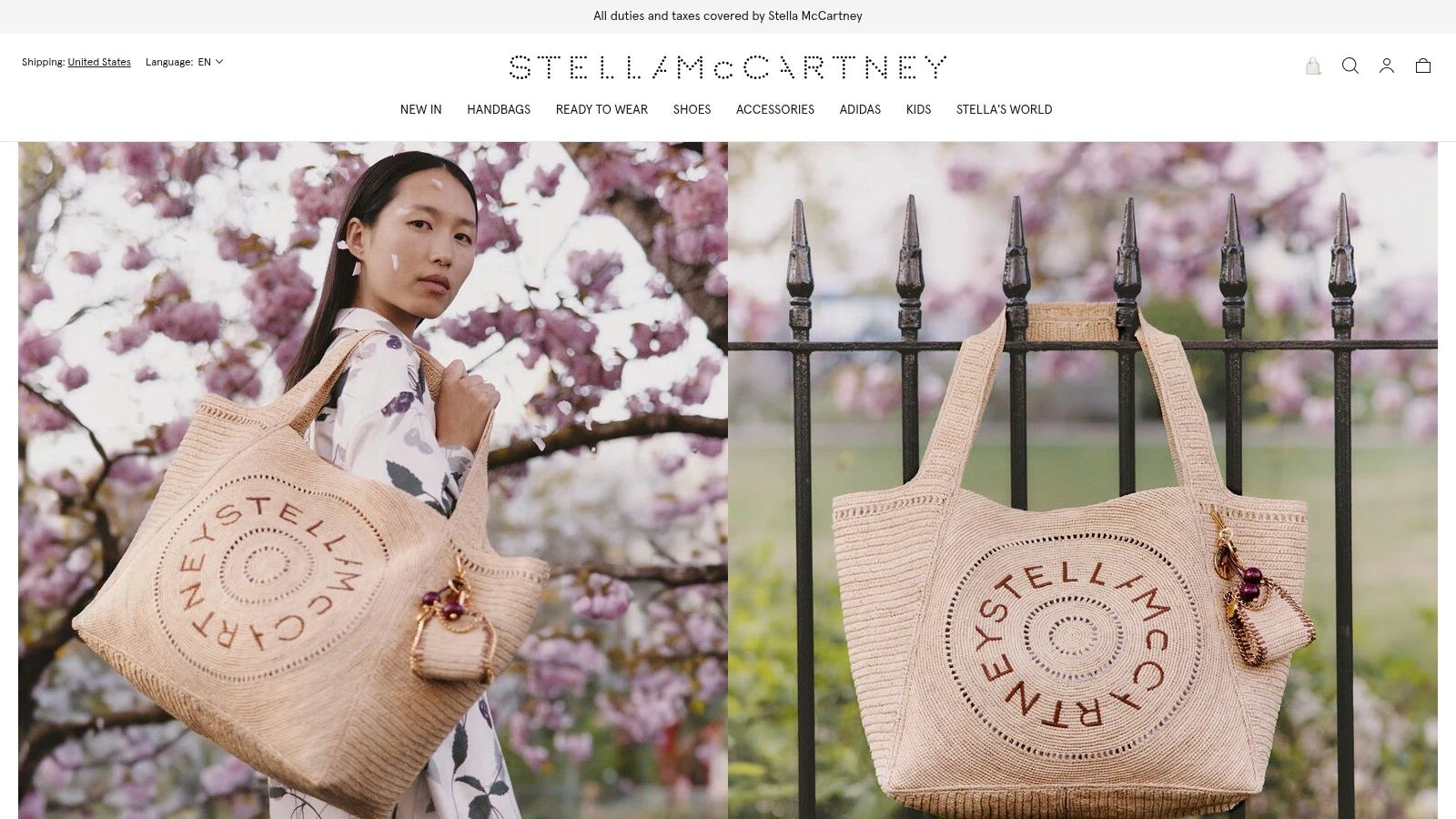
For UK shoppers seeking sustainable luxury, Stella McCartney offers a compelling proposition. The brand's vegetarian and cruelty-free design philosophy resonates deeply with ethical consumers, while its innovative use of materials like BioSequins™ showcases cutting-edge plant-based alternatives. The brand also champions circularity through repair and resale programs, extending the lifespan of its garments and minimizing waste. Further strengthening its position is a climate-positive business model employing carbon offsetting, alongside transparent supply chain reporting. This provides UK consumers with clear insights into the brand's environmental impact.
The commitment to sustainability permeates the entire Stella McCartney offering. From iconic Falabella bags crafted from recycled polyester to elegant dresses made with organic cotton, UK shoppers can find a range of luxury goods aligned with their values. While the brand’s ready-to-wear collections are a prominent feature, accessories, footwear, and even kidswear embody the same commitment to sustainable practices. This provides numerous access points for UK consumers looking to incorporate sustainable luxury into various aspects of their wardrobe.
However, the premium pricing of Stella McCartney products presents a significant barrier for many consumers, limiting accessibility. While reflecting the high quality and innovative materials, it places the brand firmly in the luxury segment. Additionally, while striving for sustainability, the brand still utilizes some synthetic materials which can contribute to microplastic pollution – an ongoing concern for environmentally conscious individuals. Finally, the limited number of retail locations globally, including within the UK, can make experiencing and purchasing Stella McCartney products less convenient than more widely available brands.
Despite these drawbacks, Stella McCartney’s unwavering commitment to ethical and sustainable practices since its founding sets it apart in the luxury fashion landscape. Its pioneering material innovation, prestigious fashion status, and comprehensive sustainability reporting offer a compelling case for UK consumers seeking true sustainable luxury. For those willing to invest, Stella McCartney provides a unique blend of high fashion and environmental responsibility. You can explore their collections and learn more about their sustainability initiatives on their website: https://www.stellamccartney.com
2. Gabriela Hearst
For the discerning shopper seeking truly sustainable luxury fashion brands, Gabriela Hearst stands out as a beacon of conscious craftsmanship. Launched in 2015, the eponymous brand prioritizes quality over quantity, weaving a narrative of timeless design and environmental responsibility. Hearst's commitment to minimizing its ecological footprint permeates every aspect of the brand, from sourcing materials to production practices. This dedication to sustainability makes it a top choice for environmentally conscious luxury consumers.
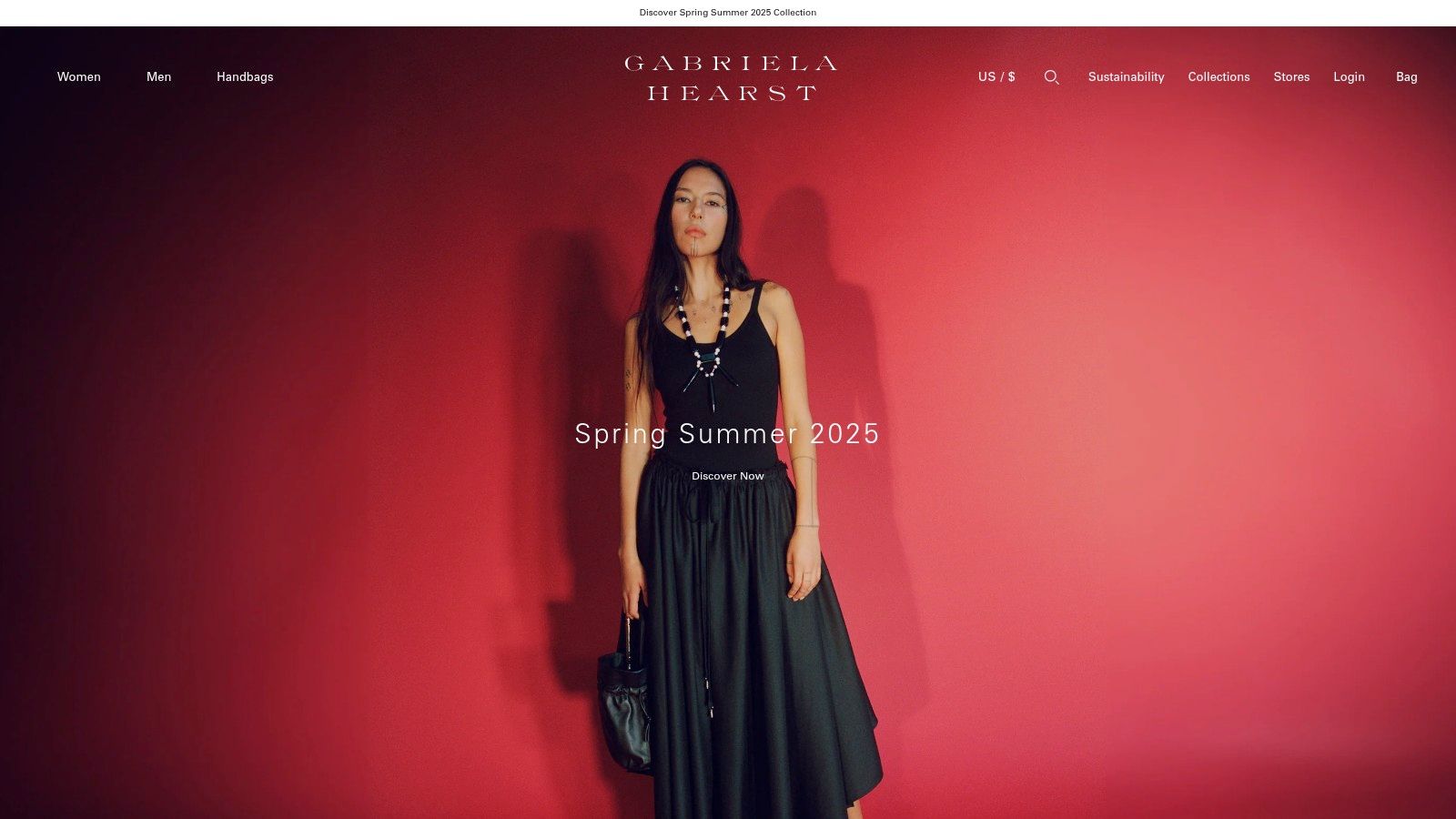
Gabriela Hearst champions the use of deadstock fabrics, giving new life to existing materials and minimizing textile waste. Furthermore, the brand incorporates biodegradable materials and renewable resources into its collections, lessening its reliance on environmentally damaging synthetics. A made-to-order model further reduces overproduction and waste, ensuring that each piece is crafted with intention and purpose. This approach distinguishes Gabriela Hearst from fast-fashion brands and even some other luxury houses that may not prioritize sustainability to the same degree. Adding to its ethical credentials, Hearst employs artisanal techniques, preserving cultural heritage and supporting skilled craftspeople. As Creative Director at Chloé since 2020, Hearst has also brought her sustainability ethos to this established French fashion house, demonstrating that luxury and environmental consciousness can coexist.
Features like limited-edition collections, biodegradable packaging, and plastic-free initiatives further solidify Gabriela Hearst's commitment to a greener future. The brand's partnership with Mylo™, a company specializing in mushroom leather, highlights its innovative approach to sustainable materials. A commitment to traceable supply chains and fair labor practices ensures ethical production from start to finish. Moreover, the brand has been staging carbon-neutral runway shows since 2019, setting an example for the industry.
Pros:
- Exceptional craftsmanship with artisanal techniques: Each piece is imbued with the care and skill of experienced artisans.
- Timeless design aesthetic that transcends trends: Investing in Gabriela Hearst means acquiring pieces that will remain stylish for years to come.
- Strong dedication to reducing environmental impact: From materials to production, sustainability is at the heart of the brand.
- Social enterprise involvement supporting communities: The brand contributes to positive social change through its partnerships and initiatives.
Cons:
- Extremely high price point limiting accessibility: Gabriela Hearst pieces are a significant investment, making them inaccessible to many. For example, handbags can range from several thousand pounds to upwards of £10,000.
- Limited production quantities can make items difficult to obtain: Due to the made-to-order model and limited-edition releases, securing a coveted Gabriela Hearst piece can require patience and planning.
- Less extensive product range compared to larger luxury houses: While the brand offers a curated selection of ready-to-wear, handbags, and accessories, the range is smaller than that of more established luxury brands.
For UK shoppers, Gabriela Hearst offers a unique opportunity to invest in truly sustainable luxury. While the price point reflects the brand's commitment to quality, craftsmanship, and ethical production, it caters to a niche market of affluent individuals who prioritize sustainability and timeless design. If you're looking for a piece that embodies both luxury and environmental consciousness, Gabriela Hearst deserves a place on your wish list. Visit the brand's website (https://gabrielahearst.com) to explore the collections and learn more about their sustainable practices.
3. Eileen Fisher
Eileen Fisher stands out among sustainable luxury fashion brands for its long-standing commitment to ethical production and circularity. Founded in 1984, the brand prioritised timeless design and durable garments long before sustainability became a mainstream concern. Eileen Fisher's dedication to responsible practices makes it an excellent choice for UK shoppers seeking high-quality, enduring pieces with a minimal environmental footprint. Its focus on organic, recycled, and regenerative materials, coupled with fair labour practices, sets a high bar within the industry.
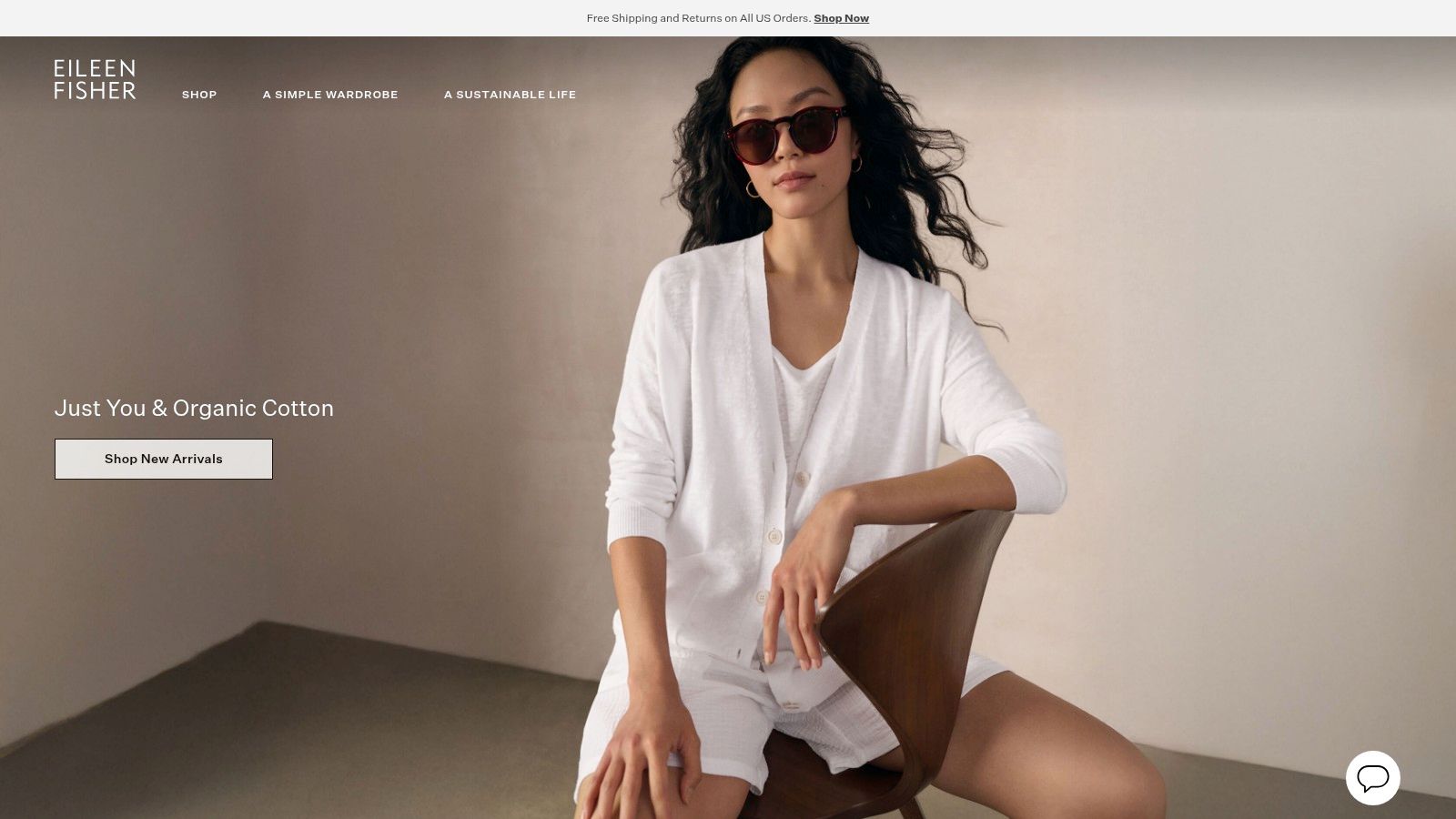
A key element of Eileen Fisher's sustainable approach is its Renew program, a circular initiative where customers can return used Eileen Fisher clothing. These garments are then either resold, repurposed into new items, or responsibly recycled. This closed-loop system minimizes waste and extends the lifecycle of each piece. Furthermore, the brand's B Corp certification, achieved in 2015, underscores its commitment to social and environmental responsibility, meeting rigorous standards of transparency and accountability. For UK consumers, this certification provides reassurance that their purchase supports a company actively striving to make a positive impact.
Eileen Fisher's dedication to sustainable materials is another defining feature. The brand actively sources organic cotton, recycled fibres, and regenerative materials, reducing its reliance on virgin resources and minimizing environmental harm. This commitment extends throughout their supply chain, with transparent factory relationships and social compliance auditing ensuring fair labour practices. While the brand is still working towards 100% sustainability across all products, its ongoing progress and transparency are commendable.
Features:
- Circular Renew program for recycling and reselling used garments
- B Corp certification with industry-leading practices
- Sourcing of organic, regenerative, and recycled materials
- Transparent factory relationships and social compliance auditing
- Timeless design philosophy opposing fast fashion
Pros:
- Inclusive sizing and age-appropriate designs catering to a broad range of UK shoppers.
- Long-established sustainability practices with demonstrable results, offering a credible choice for ethically conscious consumers.
- A relatively more accessible price point than many other luxury brands, making sustainable style more attainable.
- Educational initiatives that promote sustainable fashion and empower consumers to make informed choices.
Cons:
- The classic, minimalist aesthetic may not appeal to trend-focused consumers seeking cutting-edge designs.
- Less prominent in high-fashion spaces despite luxury-level quality and craftsmanship.
- While significantly advanced in its sustainability journey, Eileen Fisher is still working towards 100% sustainability across all product lines.
Website: https://www.eileenfisher.com
Eileen Fisher earns its place on this list of sustainable luxury fashion brands due to its pioneering efforts and long-term vision. For UK shoppers seeking timeless, high-quality garments produced with integrity, Eileen Fisher presents a compelling option. The brand's commitment to circularity, transparency, and fair labour practices makes it a leader in the sustainable luxury movement. While the aesthetic might not suit all tastes, its dedication to ethical production and enduring style offers a valuable alternative to fast fashion and less sustainable luxury options.
4. Mara Hoffman
For UK shoppers seeking sustainable luxury fashion brands, Mara Hoffman presents a compelling option. Since 2015, the brand has championed responsible fashion, focusing on swimwear, ready-to-wear, and activewear crafted from organic, recycled, and regenerated materials. Mara Hoffman’s commitment to minimising environmental impact without compromising on high design standards is evident throughout their supply chain – from the sourcing of materials to manufacturing and packaging. This dedication makes them a standout choice amongst other sustainable luxury brands.
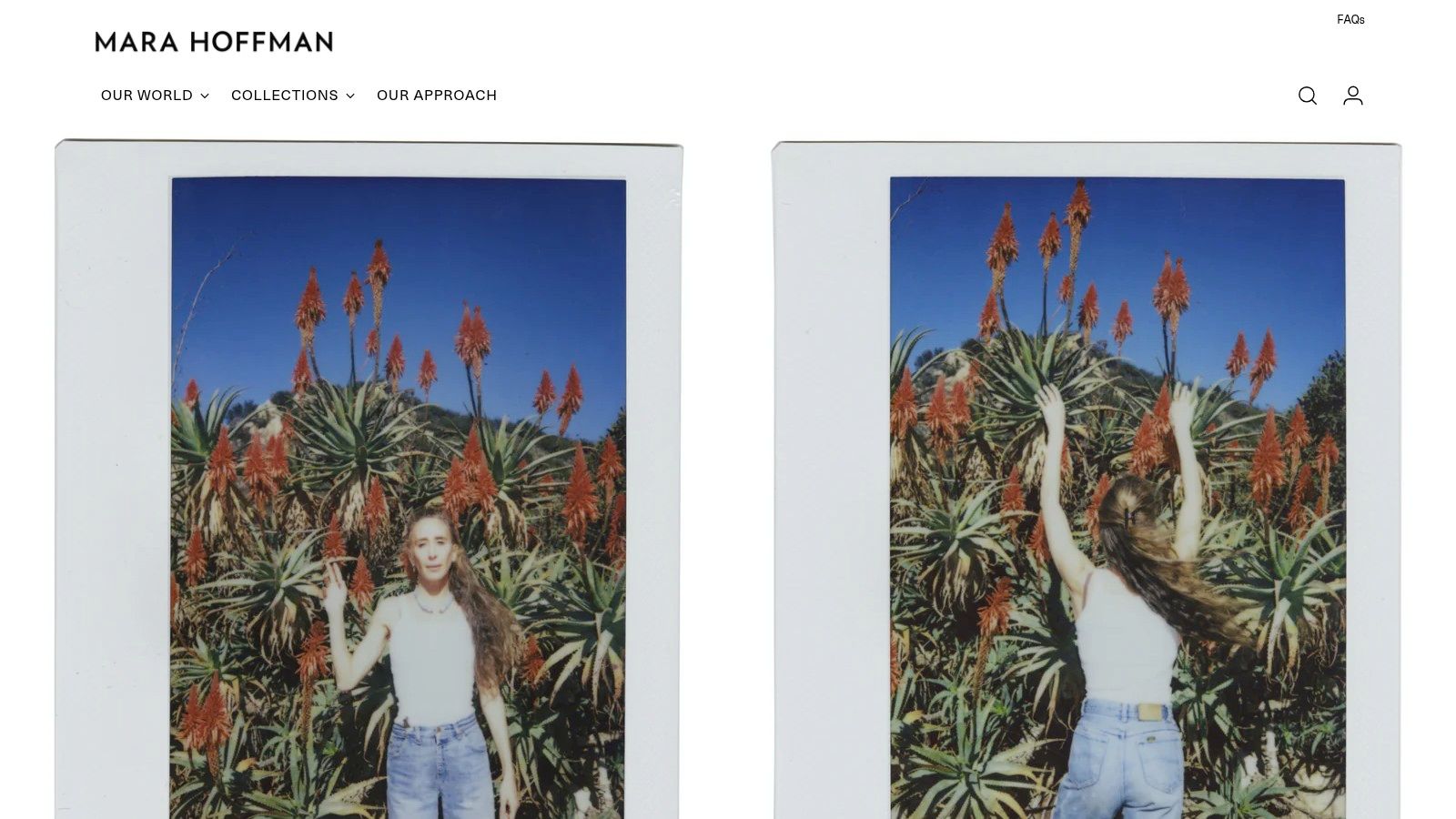
Mara Hoffman utilizes innovative textiles like ECONYL® regenerated nylon, a material created from recycled fishing nets and other nylon waste. Digital printing techniques reduce water usage significantly compared to traditional methods, further lessening the brand's environmental footprint. Their commitment extends to an extended producer responsibility model, incorporating a garment take-back program. Furthermore, the brand embraces inclusivity, offering a wide range of sizes and representing diverse bodies in their marketing campaigns. Finally, plastic-free packaging initiatives underscore their dedication to sustainability.
For the UK consumer, this translates to access to beautifully designed, ethically produced garments. Whether you're searching for a vibrant swimsuit for a holiday getaway or a stylish, sustainable addition to your everyday wardrobe, Mara Hoffman provides options that align with conscious consumerism. Their mid-luxury price point makes them more accessible than some high-end sustainable competitors while still representing an investment in quality and ethical production.
Features:
- ECONYL® regenerated nylon and other innovative textiles
- Digital printing for reduced water usage
- Garment take-back program
- Inclusive sizing and representation
- Plastic-free packaging
Pros:
- Bold, distinctive aesthetic combined with sustainability
- Transparent communication about their sustainability journey
- Mid-luxury price point offers relative accessibility within the luxury market
- Strong commitment to ethical manufacturing
Cons:
- Limited retail distribution in the UK compared to larger luxury brands. Online shopping is often the primary access point.
- The sustainability transition is still ongoing for certain product lines. Check individual product details for specific information.
- Higher price point than conventional fashion alternatives. However, this reflects the higher costs associated with sustainable materials and ethical production.
Website: https://marahoffman.com
Mara Hoffman’s dedication to transparency and continuous improvement in their sustainability journey resonates with the values of many UK consumers. While the price point is higher than fast fashion, it reflects the true cost of ethical and environmentally conscious production. If you're a UK shopper seeking sustainable luxury fashion brands that don't compromise on style or ethics, Mara Hoffman deserves serious consideration.
5. Veja
For UK shoppers seeking sustainable luxury fashion brands, Veja offers a compelling proposition. Founded in France in 2005, Veja has disrupted the luxury sneaker market by prioritizing transparency and ethical production without compromising on style. The brand meticulously selects ecological materials, including wild rubber from the Amazon rainforest, organic cotton, and recycled plastic bottles, to create sneakers that are both fashionable and environmentally responsible. Veja’s commitment to fair trade practices and ethical manufacturing ensures fair wages throughout its supply chain, making it a standout choice for conscious consumers looking to align their values with their purchases.
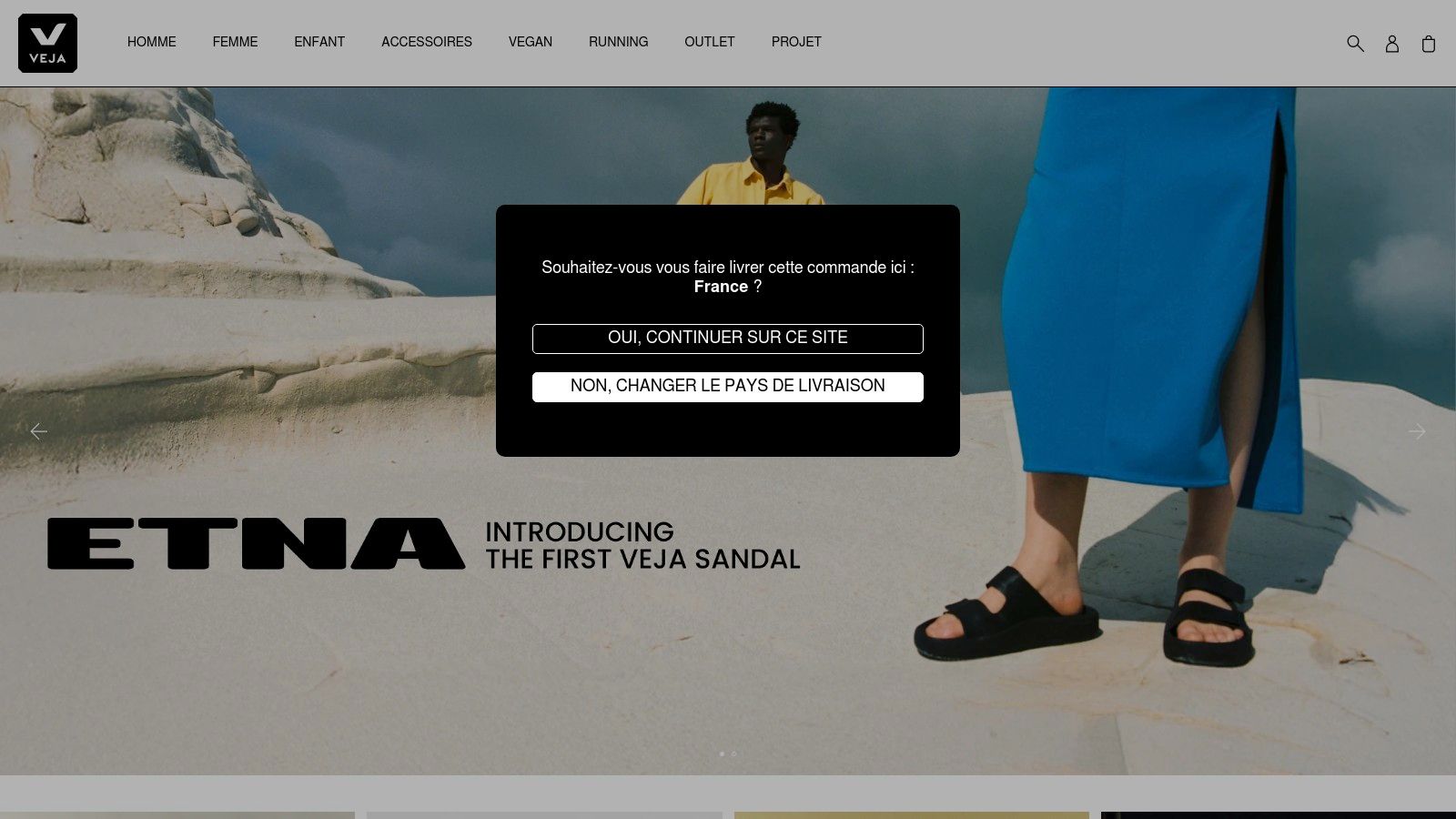
Veja's use of wild rubber sourced from the Amazon supports biodiversity conservation and provides a sustainable livelihood for local communities. Their innovative B-Mesh material, crafted from recycled plastic bottles, further reduces the brand’s environmental footprint. Moreover, the use of fair trade certified organic cotton from Brazil and Peru ensures that farmers receive fair prices and work in safe conditions. Unlike many brands that rely heavily on advertising, Veja invests those resources back into production quality and maintains a radical transparency policy, openly sharing its production costs and pricing structure with consumers. This commitment to ethical and sustainable practices has earned Veja a dedicated following among trend-conscious consumers and solidified its position as a status symbol within the conscious luxury market.
Features:
- Wild rubber sourcing supporting Amazonian conservation
- B-Mesh material made from recycled plastic bottles
- Fair trade certified organic cotton from Brazil and Peru
- Full cost transparency in product pricing
- Zero advertising policy, reinvesting in production
- Direct trade relationships with producers
- Comprehensive impact reporting
Pros:
- More accessible price point compared to other luxury sneaker brands (typically ranging from £100-£200)
- Culturally relevant and fashionable designs that appeal to style-conscious millennials and Gen Z
- Direct trade relationships empower producers and ensure fair practices
- Transparent operations and impact reporting build consumer trust
Cons:
- Limited product range compared to larger footwear brands, mainly focused on sneakers
- Potential delivery and production delays due to the ethical manufacturing timeline
- Some collections still utilise conventional leather, which may not appeal to all vegan or environmentally conscious shoppers
Comparison: While other luxury sneaker brands might offer a wider range of styles, Veja’s commitment to sustainability and transparency sets it apart. Brands like Stella McCartney also champion ethical fashion, but Veja's accessible pricing makes sustainable luxury more attainable for a broader audience in the UK.
Implementation/Setup Tips:
- Visit the Veja website (https://www.veja-store.com) to explore the current collection. The site provides detailed information on materials, sourcing, and production.
- Consider your personal style and needs when choosing a Veja model. The brand offers a variety of styles, from classic to contemporary.
- Be aware of potential delivery times, as ethical production can sometimes result in slightly longer lead times.
Veja deserves its place on this list of sustainable luxury fashion brands because it demonstrates that style and sustainability can coexist. By prioritizing transparency, ethical production, and ecological materials, Veja offers UK consumers a tangible way to invest in fashion that aligns with their values. Their commitment to fair trade and environmental responsibility resonates with the growing demand for conscious consumption, making Veja a leading force in the sustainable luxury movement.
6. Reformation
For UK shoppers seeking sustainable luxury fashion brands, Reformation offers a compelling blend of trend-forward aesthetics and eco-conscious practices. Founded in 2009, the brand has quickly become a favourite for its vintage-inspired designs and commitment to transparency. Reformation prioritizes sustainable materials like deadstock fabrics, recycled fibres, and TENCEL™ Lyocell, and manufactures primarily in its own Los Angeles factory, ensuring ethical production and minimizing its environmental footprint. While not strictly a luxury brand in the traditional sense, its contemporary price point, coupled with its dedication to sustainability, makes it a strong contender for those seeking more conscious consumption within the broader luxury fashion sphere.
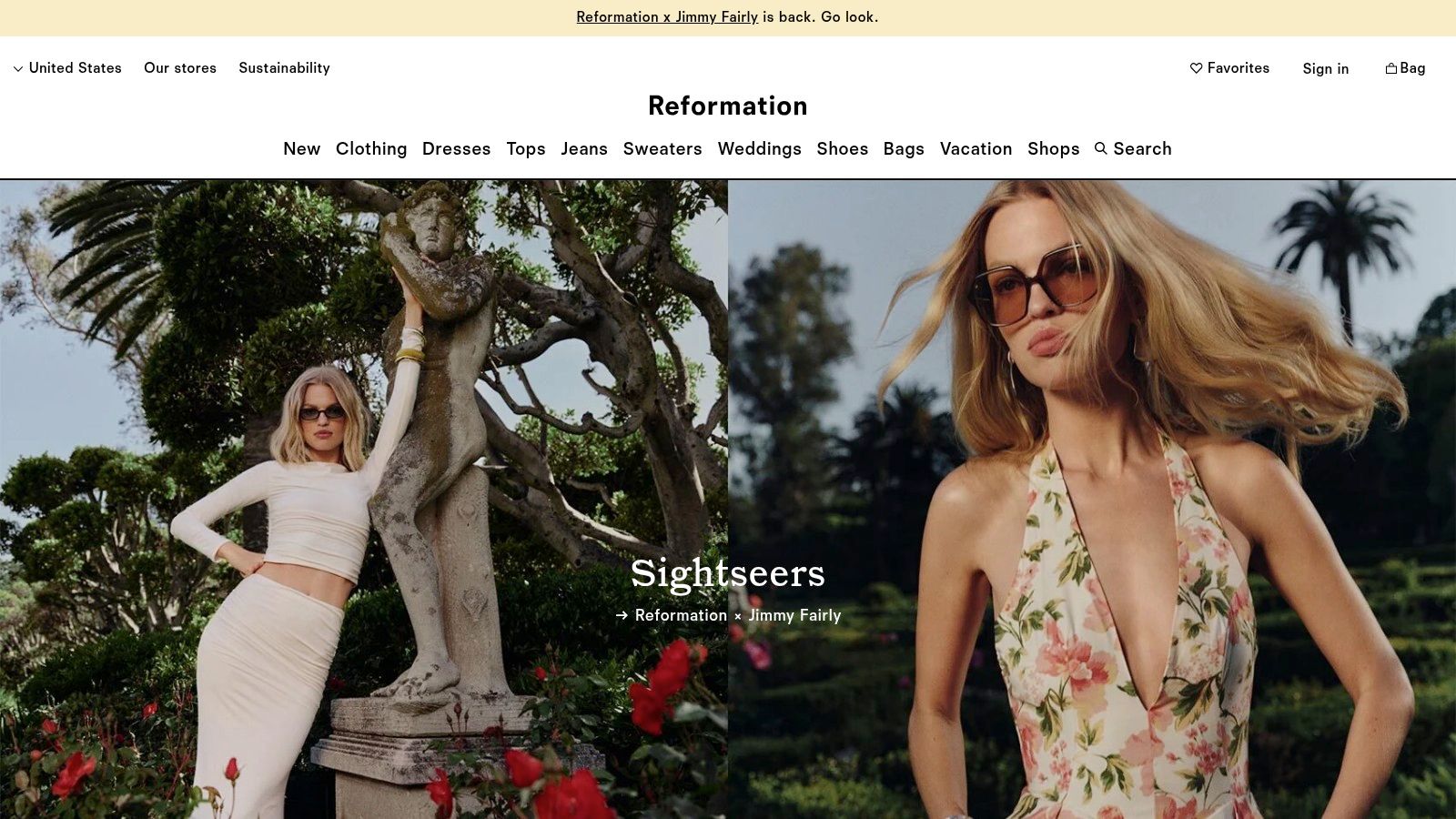
Reformation distinguishes itself through several key features. Its RefRecycling program encourages circularity by managing textile waste. Furthermore, the brand operates under a climate-positive business model, offsetting its carbon emissions and striving to remove more carbon from the atmosphere than it produces. They have even developed their own sustainable fabric innovation, Ref Active, demonstrating a commitment to pushing boundaries within the industry. The company's vertical integration, with ownership of its manufacturing facilities, allows for greater control over production processes and ethical standards. Crucially, Reformation provides real-time tracking of water, carbon, and waste savings for each product, empowering consumers to make informed choices. This level of transparency is rare, even amongst sustainable luxury fashion brands.
For UK consumers, Reformation offers a contemporary, fashion-forward aesthetic at a more accessible price point than many traditional luxury brands. Its strong digital presence and effective communication of sustainability efforts make it easy to understand the brand's values. The transparent impact metrics for each product are particularly valuable for conscious consumers. Furthermore, Reformation's size-inclusive approach with extended sizing options caters to a wider range of body types.
However, some critics point to Reformation's relatively high product turnover rate, questioning whether it truly aligns with slow fashion principles. Its primarily direct-to-consumer (DTC) business model results in a limited retail presence in the UK, making it harder to experience the garments firsthand. While Reformation is undoubtedly making strides in sustainability, its credentials might not be as comprehensive as some established luxury peers who have invested heavily in circularity and fair trade practices.
Implementation Tip: Explore Reformation's website (https://www.thereformation.com) to see their real-time impact tracker and familiarize yourself with their materials and manufacturing processes. This allows you to assess their sustainability claims and choose pieces that align with your values.
Reformation earns its place on this list by successfully bridging the gap between style and sustainability. While it may not tick every box for the strictest definition of luxury, it provides a valuable option for UK shoppers seeking fashionable, ethically produced garments with a transparent supply chain and a lower environmental impact than conventional fast fashion. Its commitment to innovation, particularly in fabric development and carbon offsetting, makes it a brand to watch in the evolving landscape of sustainable luxury fashion.
7. Patagonia
Patagonia, while renowned for its outdoor gear, has firmly cemented its place among sustainable luxury fashion brands. This is due to its premium pricing, exceptional quality, and industry-leading dedication to environmental responsibility. Founded in 1973, Patagonia became a certified B Corp in 2011, signifying its commitment to social and environmental performance, accountability, and transparency. The brand doesn't just talk the talk; it walks the walk with groundbreaking initiatives like using recycled materials, promoting repair and reuse through its "Worn Wear" program, and donating 1% of its sales to environmental nonprofits. In a truly radical move demonstrating their commitment, founder Yvon Chouinard transferred ownership in 2022 to a trust and nonprofit entirely dedicated to combating climate change. For UK shoppers seeking truly sustainable luxury, Patagonia presents a unique proposition.
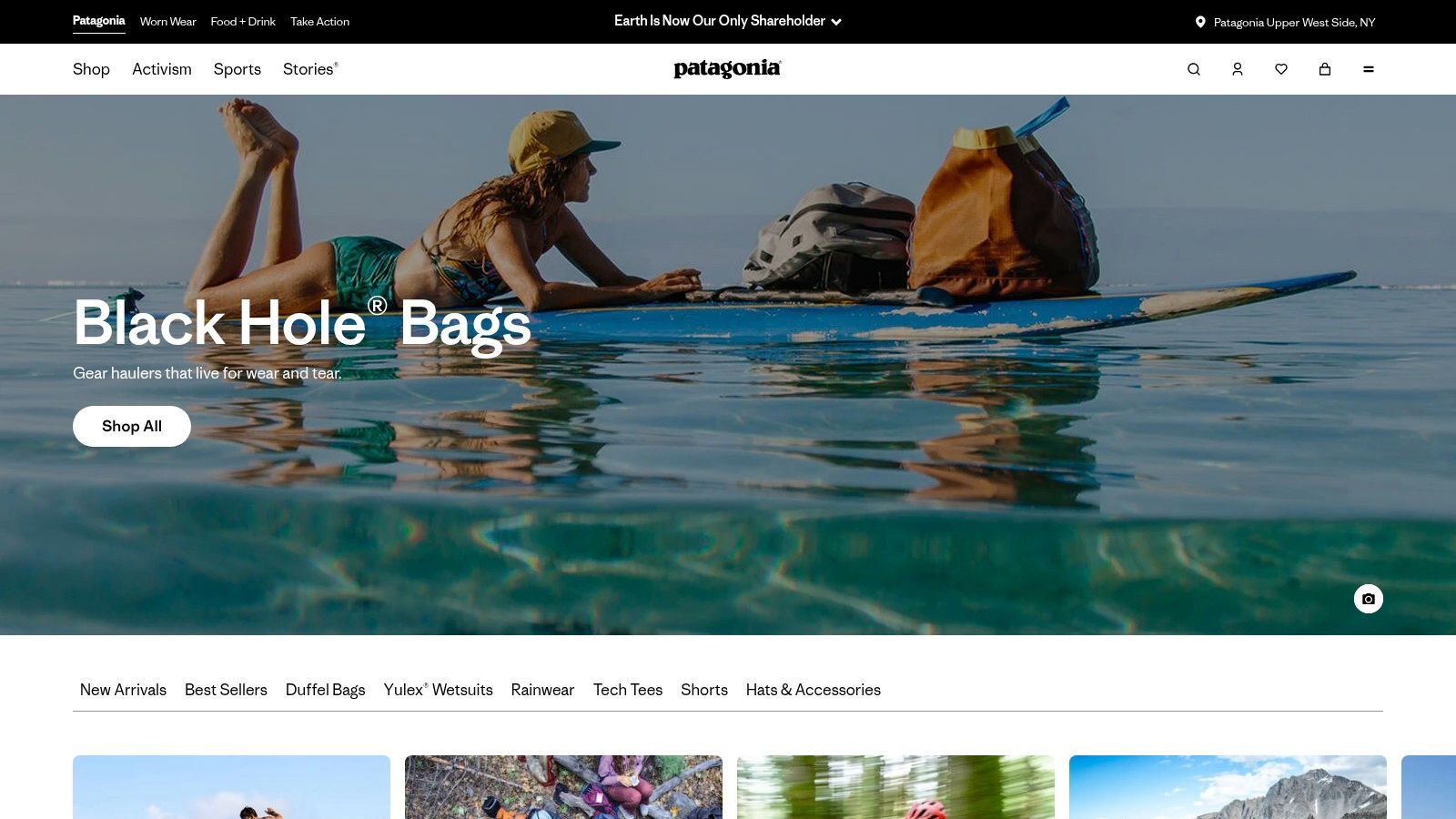
Patagonia's Worn Wear program is a cornerstone of its commitment to circularity. It encourages customers to repair their existing Patagonia garments rather than replacing them, offering repair guides, patches, and even professional repair services. The program also facilitates the resale of used Patagonia gear, extending the lifecycle of products and reducing textile waste. This resonates particularly well with UK consumers who are increasingly conscious of their environmental footprint. For those seeking investment pieces built to last, Patagonia’s durability combined with the Worn Wear program creates genuine lifetime value. Their ironclad warranty and repair services further bolster this commitment, providing peace of mind for buyers.
While Patagonia's focus on functionality results in a more utilitarian aesthetic, the exceptional quality of materials and construction, alongside their innovative sustainable practices, position them within the luxury sphere. Features like their 100% recycled down and reclaimed wool initiatives showcase their commitment to minimizing environmental impact without compromising performance. Their dedication to Fair Trade Certified™ factories and commitment to living wages ensures ethical production practices. Furthermore, their increasing use of Regenerative Organic Certified™ materials reflects their ongoing commitment to soil health and biodiversity.
Pros:
- Exceptional durability creating genuine lifetime value: Patagonia products are built to withstand demanding conditions, lasting for years with proper care.
- Ironclad product warranty and repair services: Their comprehensive warranty and easily accessible repair services contribute to the long-term value of their products.
- Industry-leading environmental activism and advocacy: Patagonia is a true pioneer in environmental stewardship, setting a high bar for other brands.
- Transparent supply chain and material sourcing: The company is transparent about its sourcing and manufacturing processes, allowing customers to make informed choices.
Cons:
- Utilitarian aesthetic may not align with traditional luxury fashion: The focus on function over high-fashion trends might not appeal to everyone.
- Limited high-fashion design elements: While stylish, Patagonia's designs prioritize practicality and performance over runway trends.
- Premium pricing compared to conventional outdoor brands: Patagonia products are priced higher than comparable non-luxury outdoor brands, reflecting their quality, ethical production, and environmental commitments.
Website: https://www.patagonia.com
Patagonia's inclusion in this list of sustainable luxury fashion brands underscores the evolving definition of luxury. It demonstrates that true luxury can be found in brands prioritizing quality, durability, ethical production, and environmental responsibility, appealing to the growing number of conscious consumers in the UK and globally who are willing to invest in pieces that reflect their values.
8. Another Tomorrow
For the discerning UK shopper seeking truly sustainable luxury fashion, Another Tomorrow stands out as a pioneer in ethical and transparent production. Founded in 2020 by Vanessa Barboni Hallik, the brand focuses on creating timeless wardrobe staples using only organic, recycled, and responsibly sourced materials. Another Tomorrow isn't simply claiming sustainability; they are proving it. Their commitment to full transparency sets them apart from many other brands within the sustainable luxury fashion landscape.

What truly sets Another Tomorrow apart is its unique digital ID system. Each garment features a QR code, allowing customers to trace the complete journey of their purchase, from the origin of the raw materials to the final production stages. This blockchain-verified supply chain transparency provides unprecedented insight into the ethical and environmental impact of your clothing. For the UK consumer increasingly focused on provenance and mindful purchasing, this level of traceability is invaluable. It empowers you to make informed decisions aligning with your values.
Beyond traceability, Another Tomorrow adheres to rigorous standards for animal welfare, exceeding industry norms. Their commitment extends to a built-in circular economy approach with an integrated resale platform, encouraging the longevity and reuse of their garments. This resonates with the growing trend of conscious consumption within the luxury market in the UK.
Features and Benefits:
- QR code traceability technology: Verify the origin and journey of each garment.
- Blockchain-verified supply chain: Ensures transparency and accountability.
- Certified organic, recycled, and responsibly sourced materials: Minimises environmental impact.
- High animal welfare standards: Supports ethical treatment of animals.
- Integrated resale platform: Promotes circularity and reduces waste.
- Timeless, minimalist aesthetic: Creates pieces designed to last beyond fleeting trends.
Pros:
- Cutting-edge technology for unparalleled transparency.
- Minimalist designs with enduring value.
- Comprehensive ethical standards across human, animal, and environmental concerns.
- Built-in circular economy model.
Cons:
- Higher price point reflecting the true cost of sustainable production. Expect to invest more compared to fast fashion or even some traditional luxury brands.
- Limited product range compared to more established brands. As a newer brand, their offerings are still expanding.
- Less established brand recognition compared to heritage luxury houses.
Implementation/Setup Tips:
Simply visit the Another Tomorrow website (https://anothertomorrow.co) to browse their collections and learn more about their unique approach to sustainable luxury fashion. The site provides detailed information on their sourcing, production processes, and ethical commitments. Using the QR codes on the garments allows you to delve into the specific journey of your chosen piece.
Comparison: While other sustainable luxury fashion brands exist, few offer the same level of comprehensive traceability and transparency as Another Tomorrow. Their digital ID system and blockchain verification are truly cutting edge.
Another Tomorrow earns its place on this list by demonstrating that true luxury can be achieved without compromising ethical and environmental responsibility. It’s an ideal choice for the UK shopper looking to invest in timeless pieces with a clear conscience, knowing that their purchase supports a more sustainable future for the fashion industry.
Sustainable Luxury Fashion Brands Comparison
| Brand | Core Features ✨ | Sustainability & Ethics 🏆 | Target Audience 👥 | Unique Selling Points ✨ | Price & Value 💰 |
|---|---|---|---|---|---|
| Stella McCartney | Vegetarian design, plant-based materials, circularity | Climate-positive, transparent reporting | Luxury, eco-conscious consumers | BioSequins™, circular repair & resale | ★★★★★ High 💰 Premium |
| Gabriela Hearst | Deadstock fabrics, made-to-order, biodegradable packs | Carbon-neutral shows, fair labor | Ultra luxury, artisanship fans | Artisanal craftsmanship, social enterprise support | ★★★★★ Very High 💰 Ultra-premium |
| Eileen Fisher | Circular Renew program, B Corp certified, organic fibers | Transparent factories, social audits | Inclusive sizing, sustainable basics | Proven sustainability, educational initiatives | ★★★★ Medium-High 💰 Moderate |
| Mara Hoffman | Regenerated nylon, water-saving digital print | Garment take-back, plastic-free packaging | Mid-luxury, activewear lovers | Bold aesthetics + ethics, mid-luxury pricing | ★★★★ Medium-High 💰 Mid-range |
| Veja | Wild rubber, recycled materials, full cost transparency | Fair trade, zero advertising | Eco-conscious sneaker buyers | Radical pricing transparency, Amazon conservation | ★★★★ Medium 💰 Accessible |
| Reformation | Textile recycling, vertical integration, impact tracking | Climate positive, quarterly reports | Trendy, size-inclusive shoppers | Real-time sustainability metrics, fashion-forward style | ★★★★ Medium 💰 Mid-range |
| Patagonia | Worn Wear repair, recycled/wool materials | Nonprofit ownership, regenerative organic | Outdoor, sustainable luxury | Lifetime durability, industry-leading activism | ★★★★★ High 💰 Premium |
| Another Tomorrow | Blockchain traceability, resale platform, animal welfare | Certified sustainable materials | New gen luxury, transparency seekers | Digital ID for product journey, circular economy built-in | ★★★★ Medium-High 💰 Premium |
Investing in a Sustainable Future of Fashion
From Stella McCartney's pioneering vegan designs to Patagonia's commitment to environmental activism, the brands highlighted in this article—including Gabriela Hearst, Eileen Fisher, Mara Hoffman, Veja, Reformation, Another Tomorrow, and more—demonstrate that sustainable luxury fashion brands are no longer a niche concept but a growing movement. These labels offer high-quality, stylish pieces while prioritizing ethical production, responsible sourcing, and minimized environmental impact. Choosing to invest in these brands means investing in a future where style and sustainability go hand-in-hand.
One of the most important takeaways is that embracing sustainable luxury doesn't require compromising on style or quality. In fact, many of these brands are leading the way in innovation, using cutting-edge materials and techniques to create truly unique and desirable pieces. If you're passionate about sustainable fashion and want to take your commitment a step further, consider exploring DIY options. Learning to make your own outfits can be a rewarding way to reduce your environmental impact and express your personal style.
For more luxury brands with a commitment to sustainable practices, be sure to explore Feinheit FZ LLC. Feinheit offers a curated selection of sustainable luxury fashion, helping you discover even more brands dedicated to ethical and environmentally conscious practices. Discover new designers and elevate your wardrobe with pieces that reflect your values. Start exploring the future of fashion today!

